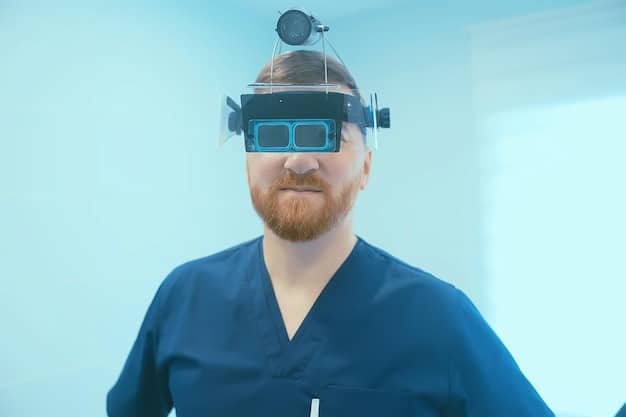The Future of Medical & Legal Dramas: Trends Shaping the Next Decade

The Future of Medical and Legal Dramas: What Trends Will Shape the Next Decade? will likely include more focus on mental health, technological integration like AI, diverse representation, ethical dilemmas raised by new technologies, and immersive storytelling that reflects our evolving understanding of justice and healthcare.
The landscape of television is ever-evolving, and the Future of Medical and Legal Dramas: What Trends Will Shape the Next Decade? is poised for significant shifts. This article delves into the potential transformations awaiting these popular genres.
Evolving Storytelling Techniques
Medical and legal dramas have captivated audiences for decades with their compelling narratives and exploration of complex human issues. As viewing habits and audience expectations change, so too must the storytelling approaches used in these genres. The future promises a shift towards more sophisticated and engaging techniques.
Interactive Narratives
One emerging trend is the incorporation of interactive elements into storytelling. Imagine a medical drama where viewers can influence the choices made by doctors, or a legal drama where the audience helps shape the direction of a case. This level of engagement could revolutionize how we consume these shows.
Multi-Platform Storytelling
The future of medical and legal dramas extends beyond traditional television screens. Shows may leverage social media, podcasts, and virtual reality to create immersive experiences that complement the main storyline. This approach allows for deeper exploration of characters and plotlines.

- Enhanced user engagement through interactive choices.
- Deeper dives into character backstories via supplementary content.
- Community building via shared experiences on various platforms.
These evolving storytelling techniques will not only enhance viewer engagement but also allow for more nuanced and layered narratives, reflecting the complexities of modern medicine and law.
Increased Focus on Mental Health
Mental health has become a crucial topic of discussion in recent years, and medical and legal dramas are beginning to reflect this shift. The future will likely see a greater emphasis on mental health issues, both for patients and for the professionals working in these high-stress fields. Understanding the psychological toll of these professions is essential.
Mental Health in Medical Settings
Medical dramas are starting to explore the mental health challenges faced by doctors, nurses, and other healthcare workers. Burnout, trauma, and moral dilemmas can all take a significant toll, and these shows are acknowledging the need for support and self-care.
Mental Health in Legal Contexts
Similarly, legal dramas are addressing the mental health of lawyers, judges, and clients. The pressure to win cases, the emotional weight of dealing with victims and perpetrators, and the ethical complexities of the legal system can all contribute to psychological distress.

- Realistic portrayals of burnout and trauma in healthcare.
- Exploration of the psychological impact of legal battles.
- Emphasis on the importance of mental health resources and support.
By integrating mental health storylines, medical and legal dramas can contribute to reducing stigma and promoting understanding and empathy.
Technological Integration and AI
Technology is rapidly transforming both the medical and legal fields, and the future of medical and legal dramas will undoubtedly reflect these changes. Expect to see more storylines involving advanced diagnostic tools, artificial intelligence, and cutting-edge legal technologies. The role of AI is set to become even more prominent.
AI in Medicine
Medical dramas may explore the use of AI in diagnosis, treatment planning, and drug discovery. AI-powered systems could assist doctors in making more accurate and efficient decisions, but they also raise ethical questions about bias and accountability.
AI in Law
Legal dramas might showcase the use of AI in legal research, document review, and predictive policing. While AI can streamline certain processes, it also raises concerns about privacy, due process, and the potential for algorithmic discrimination.
The integration of technology and AI will present both opportunities and challenges for medical and legal dramas, allowing for compelling storylines that explore the ethical and societal implications of these advancements.
Diverse Representation and Inclusion
Audiences are increasingly demanding diversity and inclusion in the media they consume, and the future of medical and legal dramas will need to reflect this. These shows have the power to shape perceptions and promote understanding by showcasing a wide range of perspectives and experiences. Representing diverse stories is crucial.
Diverse Characters and Storylines
This includes portraying characters from different racial, ethnic, and socioeconomic backgrounds, as well as individuals with disabilities, LGBTQ+ individuals, and people of different ages and religions. It also means telling stories that reflect the unique challenges and triumphs of these communities.
Authentic Representation
Representation should be authentic and nuanced, avoiding stereotypes and tokenism. Writers and producers should consult with members of the communities they are portraying to ensure accuracy and sensitivity.
By embracing diversity and inclusion, medical and legal dramas can become more relevant and engaging for a wider audience, while also promoting social justice and equality.
Ethical Dilemmas and Moral Ambiguity
Medical and legal dramas often grapple with complex ethical dilemmas, and the future will likely see even more nuanced and morally ambiguous storylines. These shows can explore the gray areas of medicine and law, raising questions about the limits of human intervention and the nature of justice. Exploring moral ambiguities is crucial.
Medical Ethics
Medical dramas may delve into issues such as end-of-life care, genetic engineering, and the allocation of scarce resources. These storylines can force viewers to confront difficult questions about the value of life, the role of technology, and the responsibilities of healthcare professionals.
Legal Ethics
Legal dramas might explore issues such as prosecutorial misconduct, wrongful convictions, and the ethics of defending guilty clients. These storylines can challenge viewers to question the fairness of the legal system and the moral compromises that lawyers sometimes have to make.
By tackling ethical dilemmas and moral ambiguity, medical and legal dramas can spark important conversations and encourage critical thinking about the values that guide our society.
Immersive Storytelling and Audience Engagement
The future of medical and legal dramas is not just about the stories being told, but also about how they are told. Immersive storytelling techniques and audience engagement strategies will play an increasingly important role in capturing and retaining viewers. Engaging the audience is key.
Virtual Reality and Augmented Reality
Imagine watching a medical drama in virtual reality, where you can step into the operating room and witness a surgery firsthand. Or imagine using augmented reality to overlay medical information onto the screen while watching a scene. These technologies could create a more visceral and engaging viewing experience.
Social Media and Online Communities
Shows can also leverage social media to create online communities where viewers can discuss episodes, share fan theories, and interact with actors and writers. This level of engagement can foster a sense of community and loyalty among viewers.
By embracing immersive storytelling techniques and audience engagement strategies, medical and legal dramas can create a more dynamic and interactive viewing experience, ensuring their continued relevance in the digital age.
| Key Trend | Brief Description |
|---|---|
| 🩺 Mental Health Focus | Increased attention to mental health issues faced by professionals and patients. |
| 🤖 AI Integration | Use of AI in diagnosis, treatment, legal research, and ethical considerations. |
| 🌍 Diverse Representation | Authentic portrayals of various racial, ethnic, and socioeconomic backgrounds. |
| ⚖️ Ethical Dilemmas | Exploring the complex ethical dilemmas and moral ambiguities in medicine and law. |
FAQ
▼
Technology will introduce AI, VR, and AR into diagnosis and treatment. This will allow for more complex and ethically challenging storylines, as well as visually stunning and highly innovative approaches to medical procedures.
▼
Diverse representation ensures a wider audience feels seen and understood. Authentic portrayals promote empathy and reduce stereotypes, making the stories more relevant and impactful across different cultures and communities.
▼
Mental health is gaining prominence as shows explore the psychological toll on medical and legal professionals. Integrating these issues helps to destigmatize mental health and encourage support and self-care practices.
▼
Ethical dilemmas will become more nuanced, exploring issues like prosecutorial misconduct and moral ambiguities when defending guilty clients. This challenges viewers to question the ethics of the legal process and the nature of justice.
▼
Immersive storytelling uses technologies like VR and AR to create interactive and engaging experiences. It enhances viewer engagement by allowing them to connect with the story on a deeper level through virtual interaction and emotional investment.
Conclusion
The future of medical and legal dramas promises exciting new directions, driven by technological advancements, a greater focus on mental health, diverse representation, and ethical complexities. These trends will not only enhance the viewing experience but also spark important conversations about the values that shape our society.





